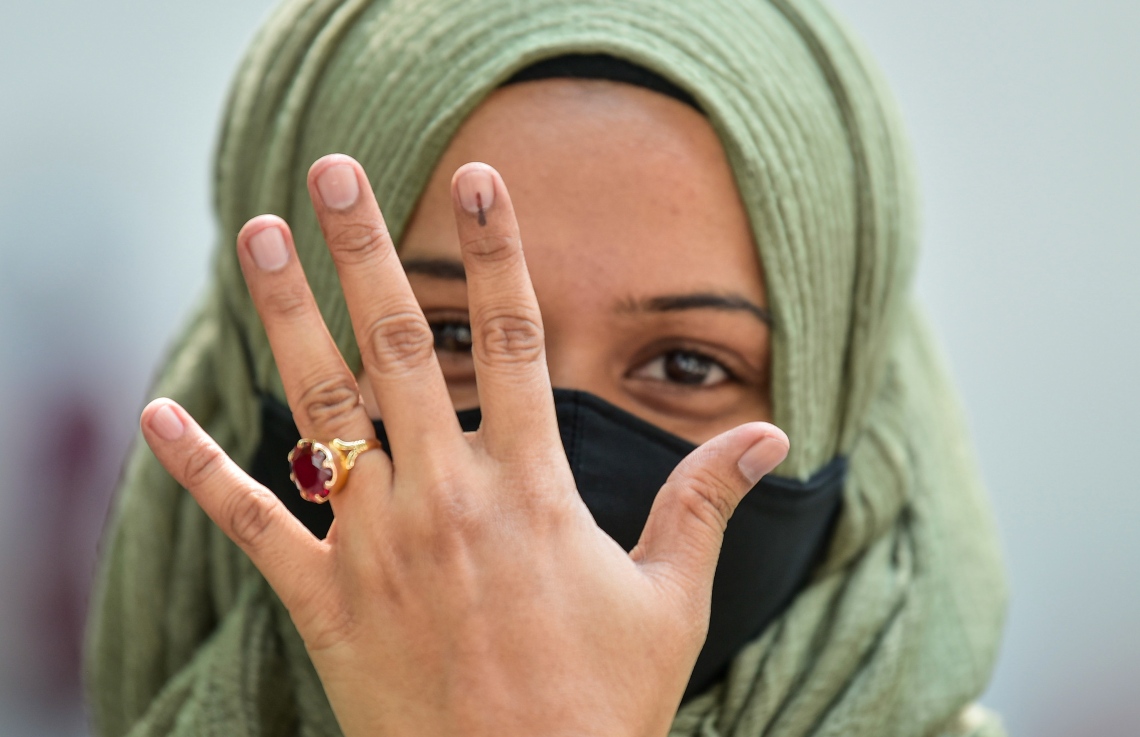Gains for Women and Democracy in the Local Council Elections in the Maldives

The Maldives ranks last in South Asia for women’s representation, so when Maldivians went to the polls for the local council elections in April 2021, and voted to give 370 seats to women, it was an historic event. This was the first time in the country’s history a gender quota was applied to the local council elections, so this election serves as an important benchmark for democracy in the country.
Unfortunately, within a month of these successful elections, on May 6, an assassination attempt on the former president and current speaker of parliament, Mohamed Nasheed, shook the island nation. And although international focus is currently centered on the bombing, it is nevertheless important to highlight the progress the Maldives continues to make in its democratic transition.
Since President Ibrahim Mohamed Solih defeated former President Abdulla Yameen three years ago, he has championed democratic reforms, including restoring human rights protections that the Yameen administration frequently violated. President Solih’s party, the Maldivian Democratic Party (MDP), also won a majority in the 2019 parliamentary elections, building on the party’s platform of increasing gender equity, ending political influence over the court system and devolving power to local councils.
Here are four key takeaways from the local council elections:
- Local councils have new powers and responsibilities.
The Solih administration pledged to push for decentralization, a departure from the previous administration, which consolidated power in the capital. In 2019, parliament passed several amendments to the Decentralization Act, devolving political, fiscal and administrative powers to councils. For the first time, newly elected councils will receive state revenue and rent generated within their jurisdictions, along with five percent of the state budget. Councils now also have the power to establish businesses and allocate land for revenue-generating purposes, like tourism, providing more financial autonomy than ever before. The council officials, newly elected in April, are the most powerful councilors in the country’s history.
However, at the national level, much work must be done to harmonize existing laws with the 2019 amendments. An IRI organized Policy Coordination Conference in March 2021 identified contradictions, such as overlapping mandates between ministries and councils, that need immediate resolution. IRI plans to hold bi-annual policy coordination conferences to secure concrete commitments from key government institutions and promote decentralization.
- Women’s political representation improves.
In 2010, it became a requirement for each local council to form a Women’s Development Committee (WDC), which is a legal entity that advises councils on development projects, works to generate income for women, and encourages women’s political participation. The April election was the first to allocate a third of all local council seats to women. As power shifts to the local councils, women’s representation will become increasingly important.
However, the lack of funding for WDCs, coupled with systemic and cultural barriers, meant that women’s political participation has not meaningfully improved since 2010. The 2021 local elections were the first election in which women WDC representatives were elected at the same time as island council members, with both men and women casting ballots for the WDC candidates.
In the lead-up to the election, IRI trained women candidates competing for both WDC and island council seats. Every women candidate who received IRI candidate training and contested island council seats won their elections, and 70 percent won their WDC seats.
- Despite challenges, the government remains committed to advancing democracy.
The COVID-19 pandemic delayed the local council elections, originally scheduled for April 2020, causing a constitutional crisis as the three-year terms of the sitting members were set to expire. To resolve the crisis, the parliament amended the constitution to extend the terms of the- councilors until the Elections Commission of the Maldives could safely hold the elections. In doing so, the current administration demonstrated its commitment to uphold the rule of law and further democracy in the Maldives. In the past, when confronted with such constitutional dilemmas, previous administrations relied on biased institutions to deliver favorable outcomes for the administration at the expense of the democratic process.
- The MDP loses the Male’ Island Council.
The governing MDP won 400 local council seats and the main opposition party the Progressive Party of Maldives’ (PPM) won 325 seats. Notably, the MDP lost the mayorship of the densely populated capital of Malé, traditionally a party stronghold. Despite the party’s loss, President Solih was quick to congratulate the incoming mayor and promised a fair share of resources, regardless of political affiliation, demonstrating his commitment to a peaceful transition of power. Similarly, the PPM mayor-elect reciprocated and assured his full cooperation in working with the current administration, regardless of political tensions that exist between both parties. For a country that saw the previous president petition the Supreme Court to annul the election result that brought his defeat, the increased political party competition through the electoral cycle and the commitment from both parties to cooperate in governing were welcome signs of a maturing democracy.
As newly elected local councilors and WDC members step into their roles, IRI will continue to assist them as they uphold their responsibilities as representatives and continue to support the democratic transition of Maldives.
Top